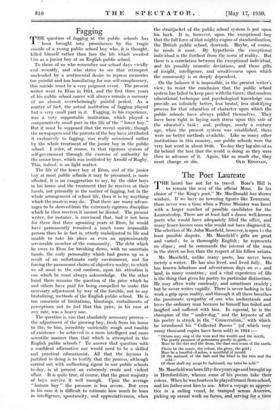Fagging
THE question of fagging at the public schools has been brought into prominence by the tragic suicide of a young public school boy who, it is thought, killed himself rather than face the life which awaited Lim as a junior boy at an English public school.
To those of us who remember our school days vividly and recently, and who strive to see that retrospect unclouded by a sentimental desire to repress memories too painful and too humiliating for our self-complacency, this suicide must be a very poignant event. The present writer went to Eton in 1914, and the first three years of his public school career will always remain a memory of an almost overwhelmingly painful period. As a matter of fact, the actual institution of fagging played but a very small part in it. Fagging, in his experience, was a very supportable institution, which played a comparatively small part in the life of the " lower boy." But it must be supposed that the recent suicide, though the newspapers and the parents of the boy have attributed it exclusively to fagging, was really occasioned rather by the whole treatment of the junior boy in the public school. I refer, of course, to that rigorous system of self-government through the exercise of authority by the senior boys, which was instituted by Arnold of Rugby. This, indeed, is no light matter.
The life of the lower boy at Eton, and of the junior boy at most public schools it may be presumed, is more affected, it is no exaggeration to say, by the elder boys in his house and the treatment that he receives at their hands, not primarily in the matter of fagging, but in the whole arrangement of school life, than it is by anything which the masters may do. That there are many advan- tages to be derived from the extremely rigorous discipline which he then receives it cannot be denied. The present writer, for instance, is convinced that, had it not been for those first three agonizing years at Eton, he would have permanently remained a much more impossible person than he in fact is, utterly maladjusted to life and unable to take his place as even an approximately serviceable member of the community. The debt which he owes to Eton for breaking down, with no uncertain hands, the early personality which had grown up as a result of an unfortunate early environment, and for forcing the paramount claims of objective reality, to which we all must in the end conform, upon his attention is one which he must always acknowledge. On the other hand there remains the question of the price which he and others have paid for being compelled to make this necessary adjustment by way of the forcible, not to say brutalizing, methods of the English public school. He is too conscious of limitations, bluntings, curtailments of perceptions not to feel that this price, in his case at any rate, was a heavy one.
The question is, can that absolutely necessary process— the adjustment of the growing boy, fresh from his home to the, to him, incredibly unfriendly rough and tumble of existence—be achieved in a more intelligent and more scientific manner than that which is attempted in the English public schools ? To answer that question with a confident affirmative one would need to be a skilled and practical educationist. All that the layman is justified in doing is to testify that the process, although carried out with unflinching rigour in our public schools to-day, is at present an extremely crude and violent affair. It is quite true, of course, that the great majority of boys survive it well enough. Upon the average " human boy " the pressure is less severe. But even in his case it is difficult to estimate how much he loses in intelligence, spontaneity, and appreciativeness, when the straitjacket. of the public school system is put upon his back. It is, however, upon the exceptional boy that the full force of that mighty engine of standardization, the British public school, descends. Maybe, of course, he needs it most. By hypothesis the exceptional individual is the, furthest from the norm of reality. But there is a correlation between the exceptional individual, and his possibly neurotic deviations, and those gifts of insight, intelligence, and sensitiveness upon which the community is so deeply dependent.
On the balance it is impossible; in the present writer's view, to resist the conclusion that the public ' school system has failed to keep pace with the times ; that modern 'educational technique and psychological knowledge can provide an infinitely better, less brutal, less stultifying process for that education of character upon which the public schools have always prided themselves. They have been right in laying such stress upon this side of the educator's task ; and, perhaps, nearly 'a century ago, when the present system was established, there were no better methods available. Like so many other institutions in this' country, our public schools were the very last word in about 1840. To-day they lag almost-as far behind the best that the world is doing as they were then in advance of it. Again, like so much else, they














































 Previous page
Previous page